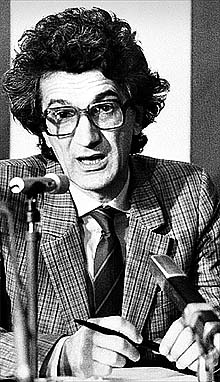Toni Negri in Buenos Aires* in Dialogo sobre la globalizacion, la multitude y la experiencia argentina
*Video Conference 14 of December of 2002 en el Centro Cultural Gral. San Martin, Buenos Aires, Argentina
This is a small section from Toni Negri in Buenos Aires during the question period after Toni’s Presentation:
Question: The dialectic has been during the last 150 years the instrument of analysis par excellence for Marxists, but you have suggested that it constitutes the form, the weapon of capitalist domination, dominion over labour. Can you elaborate this?
I believe that when the dialectic functions in an antagonistic form, it remains the central, fundamental key, of our manner of speech, as it was in thought. This is to say, the dialectic as confrontation, as a ‘clash’, affirmation-negation. The great crisis of the dialectic arrives when it is presented in its Hegelian form, that is, as synthesis. The dialectic in this case does not present itself as a confrontation, as a ‘clash’ of positions but as the ‘negation of the negation, which is to say, as supersession of the antagonistic relation. In the Marxist dialectic this dynamic of supersession is found a few times, but when Marx is encountered, above all, with an analysis of historical phenomena, the dialectical process in these terms is completely surpassed. In fact, the dialectic was presented in its Hegelian form as a decisive weapon in the construction of historical science, social science and capitalist juridical science.
The dialectical dynamic which we know in the philosophy of right and of history in Hegel represents structures that seek to contain the contradiction and overcome it. Marxism is the thought of crises, not the overcoming of contradiction. It is a thought of the rupture or breakup of the terms which are placed in the relation. It is the thinking of difference with respect to all the thought of identity. I maintain nothing more than this, this distinct tradition which is found throughout modernity, which is against synthesis, and not only the dialectical synthesis of Hegel but also the synthesis which we can find in the thought of Hobbes or in the political democratic conception of Rousseau.
The nucleus or core of a thought which is revolutionary should be a thought of crises, of the rupture of this experience. When I say this I refer to what has been profoundly affirmed in the second half of the 20th century on the philosophical terrain. I refer to all that that was the workerist reappearance of Marxism, which was achieved essentially among militants. But, on the other hand, I am also referring as well to the tendencies of then current French thought, particularly after structuralism, from Foucault, which was instrumental in fixing and pointing out difference as a possible qualification of revolutionary thought.
Another element which seems to be extremely important is for example the historical thought of subaltern studies. This thought helped and contributed to the birth in a number of ways to the postcolonial positions of Anglo-Saxon and North American thought. I would say that these are a number of elements which construct an anti-dialectical position. Lets think about this seriously: what is the dialectic in reality? The dialectic, as we know it from Hegel, is an old conception of my parents. There are two positions, one contra the other, affirmation-negation, after there is a tranquil overcoming in which there is the recuperation of one part and the other. And it is this dialectic which we have to reject, dialectic which represented an absolute and ferocious negative element in the realm of ‘real socialism’ of its realization. ‘Real socialism’ was truly an immense example of this type of dialectical thought.
translated by Guio Jacinto
